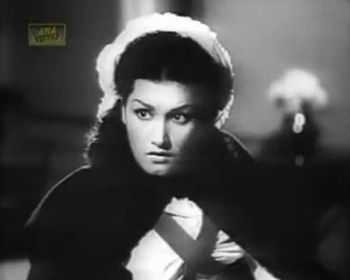If Hindi cinema has ever had an iconic onscreen villain—not a villain in one film, but in film after film—it has got to be Pran. There have been other actors, from Wasti to Ajit, Ranjeet to Madan Puri, who have played memorable villains in films: but none, in my opinion, was quite able to sustain it and make it so much his forte that his own name became a synonym for villainy (it’s common knowledge that for many years, Indian parents refused to name baby boys Pran because of Pran).
In film after film, from period dramas like Halaku to comedies like a Half Ticket, from weep fests like Do Badan to supernatural stuff like Madhumati—Pran was in them all. With aplomb, he carried off every shade of villainy, whether it was the lisping and ruthless truck driver Mohan of Kashmir ki Kali or the tuneless dacoit-cum-gentleman of Munimji. He even did the occasional unusual role (as a doctor in Aah, and as a kotha frequenter in a cameo in Devdas), until, in the late 1960s, he began to play some sympathetic characters as well. From the cynical Malang Chacha of Upkaar, to Dev Anand’s long-lost brother in Johny Mera Naam, to his role in Zanjeer: Pran proved that he wasn’t just a great villain, he was a great actor, period.
Today would have been Pran’s hundredth birthday: he was born on February 12, 1920 in Delhi. And, to mark the occasion of his hundredth centenary, I thought I’d review a Pran film with a difference. Not Pran as the villain, but Pran as the hero. A young, gangly Pran, probably not even twenty-two years old yet, plays opposite a girlish Noorjehan in one of the first Hindi films to get a lot of pre-release publicity: Khandaan.




